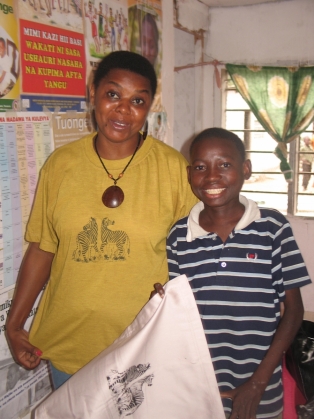You are here
Para Social Workers in Tanzania: Helping People Living with HIV/AIDS Access Treatment and Navigate Social Barriers to Care

It was a busy morning in the usually calm village of Levolosi in the Tanzanian city of Arusha. Neema, 27, and her friend Eliaremisa were going to visit a woman they had learned about from another member of the community.
The woman’s situation was dire: she had been ill for several weeks and had just been evicted from the home where she and her two children had been living.
During the visit, Neema and Eliaremisa provided counsel to their new friend, encouraging her to get tested for HIV. When the young mother tested positive, they supported her on her path to treatment. They also found her a place to live, finding a community member who was able to provide not only a home, but also a piece of land to cultivate, which represents an important means to earn a living in this part of northern Tanzania.
“The primary need of my clients is empowerment in a variety of ways,” Neema explains, stressing that removing barriers to accessing important social benefits is at the heart of her work with vulnerable individuals and families.
Neema gained a strong foundation in the knowledge and skills she needs to provide critical support to orphans, vulnerable children, and others in need in her community through her participation in the Para Social Worker (PSW) Training Program being implemented by the American International Health Alliance (AIHA) with support from the US President’s Emergency Plan for AIDS Relief (PEPFAR) and the US Centers for Disease Control and Prevention (CDC) in Tanzania.
AIHA’s PSW program provides skills-based training in social work case management and child development to caregivers, empowering countries to strengthen human resource capacity to more effectively address the immediate needs of vulnerable children and families through the development of a previously underutilized segment of the workforce and has been implemented in Nigeria and Ethiopia and soon in Mozambique.
The PSW training package varies slightly from country to country based on local needs, but the basic model includes an introductory course approximately two weeks in duration. This course introduces key social work concepts, such as using empathy and an unbiased approach when working with clients; development of a mutually agreed-upon focus of work and desired outcomes starting where the client is; and advocating for client access to services. The training package also teaches practical skills in outreach and client identification, needs assessment, case management, child development, resource linkages, family support, counseling, ongoing service coordination, and avoiding professional burnout. Upon completion of the introductory course, participants undergo six months of supervised field work and mentoring before taking a follow-up course that focuses on specialized skills related to caring for vulnerable children and families. Topics covered include: stigma reduction; collaboration with local governments; care and support for children living with HIV; HIV risk reduction; addressing personal and cultural biases when working with key populations; and addressing the needs of diverse family situations.
In response to a call by her village government for new community volunteer trainees, Neema entered the program in November 2014. Upon completion of the training, she returned home to Levolosi, a rural community that, like so many others, lacks professional social workers.
Neema says she really appreciates that the PSW training has set her apart from other community volunteers working to support vulnerable groups by arming her with unique skills needed to handle sensitive issues and help her clients through complex social challenges.
Community members and leaders alike also appreciate Neema’s work in supporting vulnerable groups in Levolosi, particularly people living with HIV and orphans and vulnerable children. She collaborates with other stakeholders to identify people in need and the community-based organizations or individuals that offer critical support. Neema also provides counseling, linkages, and referrals to crucial services, such as healthcare, economic empowerment, and education.
According to Neema, confidentiality and relationship-building are two of the most useful skills she has acquired. Without these, she admits, she would not be able to effectively support her clients — many of whom face very serious and complex situations.
“I reassure them that I am with them all the way through,” Neema states. “I do not simply identify the clients, speak to them, and leave them. I make sure they receive the care they need even beyond my purview as I work to address individual needs of vulnerable children, people living with HIV, and their households.”
AIHA, through its HIV/AIDS Twinning Center Program, has supported social work education — including the PSW Training Program — in Tanzania since 2006. With PEPFAR support, we worked closely with the Tanzania Ministry of Health, Community Development, Gender, Elderly and Children; the Institute of Social Work (ISW); and technical resource partners at Jane Addams College of Social Work (JACSW) and the Midwest AIDS Training and Education Center (MATEC) of the University of Illinois, Chicago, to support the development of a national PSW curriculum with enhanced HIV/AIDS competencies.
PSWs are trained and deployed across the country to deliver psychosocial services at the community level. To date, 4,682 community-based caregivers have completed phase one of the PSW training and more than 2,600 have completed the full course to become certified PSWs. In September 2016, ISW assumed full ownership of the PSW Training Program and now collaborates directly with other implementing partners to train PSWs throughout the country.
In 2012, AIHA worked closely with Tanzania’s Department of Social Welfare and our partners at ISW, JACSW, and MATEC to develop a mid-level Social Welfare Assistant (SWA) Training Program. The SWA program helps bridge Tanzania’s human resource gap in the health and social welfare sectors. It also provides a career ladder for members of the country’s social welfare workforce.
Developed to complement the existing PSW Training Program, the SWA Program uses ISW’s certification curriculum to qualify SWAs to work as government or NGO employees at the ward level. This year-long competency-based program includes both classroom lessons and a field practicum focusing on social work processes, policies, and laws governing services to vulnerable populations such as children, people with disabilities, and the elderly. ISW continues to operate this program and has to date graduated more than 140 SWAs.
This guest blog was prepared by Ronald Nakaka, Tina Quinby, and Kathryn Utan and submitted in honor of World AIDS Day.
AIHA provides technical assistance through comprehensive, integrated, and volunteer-driven partnerships and initiatives that help low- and middle-income countries build institutional and human resource capacity to create a strong foundation for delivering high-quality, inclusive health services. Our comprehensive, multi-pillar approach to health system strengthening has enabled us to achieve sustainable outcomes through more than 175 partnerships in Sub-Saharan Africa, Central and Eastern Europe, Asia, and the Caribbean.
AIHA has more than 24 years of experience working with host country governments, donors, and other key national and international stakeholders to address critical public health issues such as HIV/AIDS and other infectious diseases, maternal and child health, primary healthcare, emergency medicine, and a broad range of health professions education and development.
Cover photo:
“Para Social Workers provide important support to the government. They are a key part of the health and social support workforce and have greatly reduced the workload of social workers at the village, ward, and district levels in Tanzania. This program has opened a lot doors for our trainees, who recognize that they now have a path to further education.”
- Asha Mbaruku, Para-Social Worker Supervisor and Trainer, Kisutu Juvenile Court, Dar es Salaam, Tanzania.
Photo: Courtesy of AIHA/Tanzania

